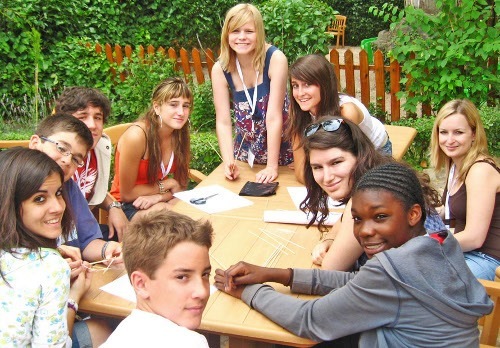Teaching English to Children in Summer
Camps Abroad
A Great option for Native Speakers
by Deborah Clark

|
|
Summer teaching exchange for
teens or adults.
|
In the month I spent working as an English Native Speaker camp counselor in Poland I was really in the best of all worlds. I taught during the morning and had the rest of the day free. At least free of lessons: I was expected to mingle and play with the campers. The children, from seven to 16, were in awe of talking to a real native speaker.
Like the children, the counselors came in all varieties. Some of us were native speakers who had the summer off from our teaching duties. Others were students offsetting the costs of trekking through Europe. At 44, I was the oldest English counselor, but not the oldest counselor at camp. One woman, along with her 21-year-old daughter, had been doing camps for five years. While there are no age restrictions, you should be physically fit.
From Europe to Asia, there is a camp wherever you might want to go. The one I worked at was typical of many European camps. It was situated in a pension or family-style hotel. Mornings started with breakfast followed by English lessons, then free time or a walk to the center of town. Back in time for lunch in the dining hall and games and field trips in the afternoon. After supper, contests of knowledge, tournaments between the counselors’ groups, and dances were the norm.
Summer Camp Advantages
Teaching English in a summer camp has many advantages: There is a very short time commitment. Most camps run two to four weeks. The longest time is usually 12 weeks, the period that school is out for the summer. Field trips to local points of interest are paid for by the camp. There is no cost for food or accommodations.
The disadvantages are that you are expected to be at camp for the entire duration of the session and your free time is not quite your own. You are a role model for the campers and an ambassador for your country at the same time.
Here are a few things you can do and bring to make camp even more fun than when you were a kid: Bring copies of old camp songs in English for those nights around the campfire. Card tricks and parlor games are also great to have. You will probably be asked to produce authentic “English” games or stories. Having copies of them will help your memory tremendously. The most requested item when I was at camp was the one thing I didn’t bring with me: an American football.
Research Camps
If you think you would like to be a counselor, research the camp and who runs it. How long have they been in business and what school are they attached to? Ask for names and email addresses of other native speakers or English teachers. They can give you the real lowdown.
Few camps pay airfare. You should have a roundtrip ticket and health insurance (not all camps will cover this). You should also have enough money for incidentals since you will not get paid until after the camp is over. You will need a work permit. If the company says you don’t need one, check yourself at the country’s embassy website.
You can get a good idea of the quality of
the jobs by surfing the organizations’ websites and checking
out their forums. Posting questions on ESL forums boards is a
great way to find where the best jobs are; most of the people
on the forum have been to camp or know someone who has been there.
If you get caught without a valid permit
you could be deported, and you may have problems entering other
countries in the future. Do your own research and investigate
the position thoroughly.
Homestay, Tutoring, and Language Exchange Options
An option to teach if you tend to be cautious
or seek full cultural immersion is often to stay with families and tutor their children. There
are several programs that allow you to do so, just as as there several
language exchange programs where you volunteer your English in
exchange for learning their native language.
Deborah Clark loves traveling, teaching, and walking up mountains in Europe.
|
